The
Brownsteins in the Land of Israel
Chapter
22:
Family
Road Trip -- Across the Pond
January
23, 2005
Just
a few things current event to start:
It
was reported by several sources that the tsunami that will probably end up
costing at least a half a million lives was caused by Israel: "…official
Palestinian television last week
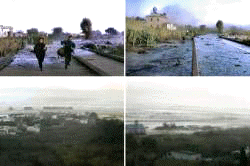 blamed
Israel for the tsunami in southeast Asia, preached the
blamed
Israel for the tsunami in southeast Asia, preached the
 destruction
of Israel and the U.S..."; "could
have been the result of joint American, Israeli and Indian underwater weapons
testing, an Egyptian weekly and other Arab media charged."; and
"In
media commentaries and sermons, the tsunami is being blamed on the region’s
favorite villains, starting with Israel and the United States, and on the sin
of the nations ravaged by the disaster."
Keeping in mind that the tsunami-causing earthquake measured 9+ on the
Richter scale, at least 5000 times more powerful than the $40 billion
Northridge Earthquake, I think you can see that we are, indeed, a very
powerful little nation.
destruction
of Israel and the U.S..."; "could
have been the result of joint American, Israeli and Indian underwater weapons
testing, an Egyptian weekly and other Arab media charged."; and
"In
media commentaries and sermons, the tsunami is being blamed on the region’s
favorite villains, starting with Israel and the United States, and on the sin
of the nations ravaged by the disaster."
Keeping in mind that the tsunami-causing earthquake measured 9+ on the
Richter scale, at least 5000 times more powerful than the $40 billion
Northridge Earthquake, I think you can see that we are, indeed, a very
powerful little nation.
I'm
also taken by the recently completed "Palestinian elections".
If there is one man in
 Israel,
indeed the world, whose word I trust implicitly, it is Natan
Sharansky. On January 6,
2005, three days before the election, Sharansky set the record straight
concerning the difference between this election -- a one-party, Soviet style
international show -- and free elections: "That
monitors will probably declare these elections free of fraud should also not
earn them a democratic imprimatur. Soviet elections were also free of fraud.
There was simply only one party on the ballot."
And then, confirming fraud, a week after the election came the report
that 46 of the top Palestinian election officials resigned because, "…pressures
and threats lessened the degree of the integrity of the election…",
as reported by Al-Jazeera. Leave
it to our Palestinian friends to recognize and speak out against oppression
and injustice after having participated in it.
Of course, the cherry on the top of this creamy cupcake are the words
of the antithesis of Natan Sharansky, former President pro-Arab
Jimmy Carter, a man who never saw an enemy
Israel,
indeed the world, whose word I trust implicitly, it is Natan
Sharansky. On January 6,
2005, three days before the election, Sharansky set the record straight
concerning the difference between this election -- a one-party, Soviet style
international show -- and free elections: "That
monitors will probably declare these elections free of fraud should also not
earn them a democratic imprimatur. Soviet elections were also free of fraud.
There was simply only one party on the ballot."
And then, confirming fraud, a week after the election came the report
that 46 of the top Palestinian election officials resigned because, "…pressures
and threats lessened the degree of the integrity of the election…",
as reported by Al-Jazeera. Leave
it to our Palestinian friends to recognize and speak out against oppression
and injustice after having participated in it.
Of course, the cherry on the top of this creamy cupcake are the words
of the antithesis of Natan Sharansky, former President pro-Arab
Jimmy Carter, a man who never saw an enemy 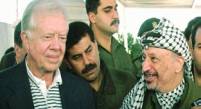 of
Israel he didn't like or
of
Israel he didn't like or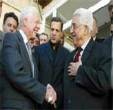 an Israeli Prime Minister
who hadn't offered
enough: "When
asked if he was pleased with the elections process so far, he answered with a
curt, "No." Carter spent the greater part of the morning trying to
negotiate with the Israelis to allow Palestinians to vote in East Jerusalem
even if their names were somehow not on the list."
Way to keep your eye on the ball!
an Israeli Prime Minister
who hadn't offered
enough: "When
asked if he was pleased with the elections process so far, he answered with a
curt, "No." Carter spent the greater part of the morning trying to
negotiate with the Israelis to allow Palestinians to vote in East Jerusalem
even if their names were somehow not on the list."
Way to keep your eye on the ball!
 Finally,
as if anyone should be surprised, within days of international pressure, with
massive numbers
Finally,
as if anyone should be surprised, within days of international pressure, with
massive numbers 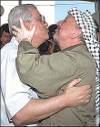 of
Israeli tanks on the outskirts of Gaza poised to cleanse that cesspool of what
Mahmoud Abbas (a.k.a. Abu Mazen a.k.a. Arafat
II) referred to as "freedom
fighters" against the "Zionist enemy", Mahmoud seems to
have miraculously
shut down Palestinian artillery fire into Israeli civilian communities
with more ease than Betty Crocker
could whip up a cake. It makes one wonder who his predecessor really thought was being
fooled.
of
Israeli tanks on the outskirts of Gaza poised to cleanse that cesspool of what
Mahmoud Abbas (a.k.a. Abu Mazen a.k.a. Arafat
II) referred to as "freedom
fighters" against the "Zionist enemy", Mahmoud seems to
have miraculously
shut down Palestinian artillery fire into Israeli civilian communities
with more ease than Betty Crocker
could whip up a cake. It makes one wonder who his predecessor really thought was being
fooled.
Feature
Presentation
It
was near the end of Hanukkah. My
family and I had just returned from America the day before. I was in the minivan on the
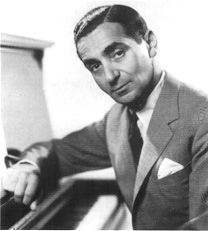 way home
with a load of groceries that pretty much fulfilled my wife's requests -- or
as well as this husband could. More
from habit than need, I turned on the radio.
I could not figure out
way home
with a load of groceries that pretty much fulfilled my wife's requests -- or
as well as this husband could. More
from habit than need, I turned on the radio.
I could not figure out
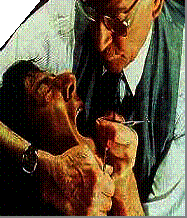 off
the bat if it was Frank
or Bing, but it ended
up being Dean's
"White Christmas". I
was still so jet-lagged that I was slow to take offense, and at least it was written
by a Jew. But when that
winter blast ended soon enough, my discomfort lurched, like Hoffman on Olivier's dental chair,
when, as I drove down my Jerusalem street, the next song was "Jingle
Bells". With no readily
available,
convenient, xenophobic excuse,
I suddenly found myself having to contemplate how much of what we hoped we had
left behind in America was relentlessly creeping into Israeli culture, just as
good toilet
off
the bat if it was Frank
or Bing, but it ended
up being Dean's
"White Christmas". I
was still so jet-lagged that I was slow to take offense, and at least it was written
by a Jew. But when that
winter blast ended soon enough, my discomfort lurched, like Hoffman on Olivier's dental chair,
when, as I drove down my Jerusalem street, the next song was "Jingle
Bells". With no readily
available,
convenient, xenophobic excuse,
I suddenly found myself having to contemplate how much of what we hoped we had
left behind in America was relentlessly creeping into Israeli culture, just as
good toilet 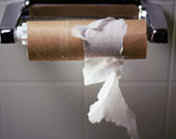 paper
and Duncan Hines (parve)
cake mix had made their indelible marks.
But Christmas music in Jerusalem is a blazing red flag, a line in the
sand crossed, a heretofore sacrosanct mental security barrier that I thought
had been authorized by the UN
in 1947, intended to protect me from cultural terrorism.
I had absolutely no idea yet how this was going to end, but I was
certain of at least one thing: I had just experienced "a Chronicle
moment"…
paper
and Duncan Hines (parve)
cake mix had made their indelible marks.
But Christmas music in Jerusalem is a blazing red flag, a line in the
sand crossed, a heretofore sacrosanct mental security barrier that I thought
had been authorized by the UN
in 1947, intended to protect me from cultural terrorism.
I had absolutely no idea yet how this was going to end, but I was
certain of at least one thing: I had just experienced "a Chronicle
moment"…
A
few weeks earlier we had set out on our trip to America.
Because we were traveling to several cities and I am never sure which
airline will go bankrupt next, I spent most of my accumulated United miles on
this trip. Unfortunately, United
does not fly to Israel. One of their partners, Air Canada, had no room for us.
Which meant relying on either Air Austria
 (not
much of a choice and no seats either) or their only other partner that flies
to Israel: Lufthansa, a.k.a. "Air Germany."
(not
much of a choice and no seats either) or their only other partner that flies
to Israel: Lufthansa, a.k.a. "Air Germany."
It
was with a considerable amount of hesitation that I informed my wife, Sara, of
our host airline. After all the
grief I had given to so many people for years about flying Lufthansa to
Israel, I knew Sara would be more than a little amused at my predicament.
When the disbelief wore off, Sara and I started to get downright
anxious about the prospect of hearing German for hours at a time, even more so
for Sara as her first trip out of Israel would be on "that" airline
-- laying over several hours in Frankfurt.
 The
night of departure, we arrived at Israel's brand-new Terminal Three so early
that the security line had not even formed, not that there was anybody to
check us anyway. Eventually the
security shift started and we got in line with a lot of evangelicals and very
few Israelis. My son, Yehuda,
announced to everyone within earshot the entire itinerary of our trip.
"First we're going to Uncle Jeb.
He's in Baltimore. He's my
daddy's brother. Aunt Jois will
be there, too. She's my daddy's
sister. She lives in Portland,
but we're not going there. We're
going to see Bette and Noam and Ari and Elana, but we saw Elana a lot last
year because she lived in Jerusalem and we saw Bette and Noam in the summer
because Uncle Dudi is Israeli… Then we are going to New York. We're going to see Cousin Joy and the Statue of Liberty.
Then we're going to Los Angeles to see Disneyland.
I used to live in Los Angeles, but now I live in Jerusalem.
I am an Israeli…"
The
night of departure, we arrived at Israel's brand-new Terminal Three so early
that the security line had not even formed, not that there was anybody to
check us anyway. Eventually the
security shift started and we got in line with a lot of evangelicals and very
few Israelis. My son, Yehuda,
announced to everyone within earshot the entire itinerary of our trip.
"First we're going to Uncle Jeb.
He's in Baltimore. He's my
daddy's brother. Aunt Jois will
be there, too. She's my daddy's
sister. She lives in Portland,
but we're not going there. We're
going to see Bette and Noam and Ari and Elana, but we saw Elana a lot last
year because she lived in Jerusalem and we saw Bette and Noam in the summer
because Uncle Dudi is Israeli… Then we are going to New York. We're going to see Cousin Joy and the Statue of Liberty.
Then we're going to Los Angeles to see Disneyland.
I used to live in Los Angeles, but now I live in Jerusalem.
I am an Israeli…"

 Soon
enough we squeezed into our coach-class row, my wife all giddy about how
beautiful the Airbus
Soon
enough we squeezed into our coach-class row, my wife all giddy about how
beautiful the Airbus  A-330
was in comparison to the Boeing 777. I
think the thin air had
gotten to her because, honestly, it simply sounded like gibberish to me, like
insisting to me that Adidas
A-330
was in comparison to the Boeing 777. I
think the thin air had
gotten to her because, honestly, it simply sounded like gibberish to me, like
insisting to me that Adidas  is
better than Nike. Nonetheless, if it
makes my Paris-born wife happy to believe that her heavily subsidized
Euro-trash-bus can hold a candle to the sleek jumbo jet made in my Pacific
Northwest, who am I to argue?
is
better than Nike. Nonetheless, if it
makes my Paris-born wife happy to believe that her heavily subsidized
Euro-trash-bus can hold a candle to the sleek jumbo jet made in my Pacific
Northwest, who am I to argue?



 Mealtime
came and, despite the thousands of calories we had already snacked on just for
the fun of traveling, we were looking forward to that special moment when a
Lufthansa flight attendant would announce, "Herr Brownstein: here is your
kosher meal (that you ordered three months ago and verified a month ago and
also four days ago)." It didn't happen. Of course, normally I
would have leapt, like Bob
Beamon, to the obvious conclusion that not having our kosher meals onboard
German Airlines is a cut and dried case of anti-Semitism. Call Marvin
Heir, right? No, not in this particular case. With the flight
originating from Tel Aviv, even Johnnie
Cochran would have had a hard time using the race card. On the other
hand, the Lufthansa attendants were extraordinarily gracious -- almost too
compassionate about the mishap. In fact, in contrast to every American
airline that has botched our meals, Lufthansa almost immediately took three
complete sets of kosher meals out of reserve practically without missing a
beat -- two of which we ate.
Mealtime
came and, despite the thousands of calories we had already snacked on just for
the fun of traveling, we were looking forward to that special moment when a
Lufthansa flight attendant would announce, "Herr Brownstein: here is your
kosher meal (that you ordered three months ago and verified a month ago and
also four days ago)." It didn't happen. Of course, normally I
would have leapt, like Bob
Beamon, to the obvious conclusion that not having our kosher meals onboard
German Airlines is a cut and dried case of anti-Semitism. Call Marvin
Heir, right? No, not in this particular case. With the flight
originating from Tel Aviv, even Johnnie
Cochran would have had a hard time using the race card. On the other
hand, the Lufthansa attendants were extraordinarily gracious -- almost too
compassionate about the mishap. In fact, in contrast to every American
airline that has botched our meals, Lufthansa almost immediately took three
complete sets of kosher meals out of reserve practically without missing a
beat -- two of which we ate.
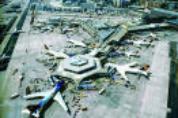 We
landed in Frankfurt for the three-hour layover. Without exaggeration,
Frankfurt has the least comfortable airport I have ever been forced to hang
out in. Because we were early for
the connection, we were actually barred from going to the gate, a first for
me; the efficient German policy is to put 10,000 people in a duty-free area
fighting for one chair. It really sucked. When
our time finally came to go to the
We
landed in Frankfurt for the three-hour layover. Without exaggeration,
Frankfurt has the least comfortable airport I have ever been forced to hang
out in. Because we were early for
the connection, we were actually barred from going to the gate, a first for
me; the efficient German policy is to put 10,000 people in a duty-free area
fighting for one chair. It really sucked. When
our time finally came to go to the
 gate,
Sara and I purposely readied our Israeli passports to show German security.
Not to be outdone, because Sara does not bare her head in public, our
German friends hustled her off to a little booth where a woman removed Sara's
hat and ran her fingers through my wife's hair just to be sure she wasn't
stowing a bomb in there. Yehuda
and Batya were also frisked for the first times in their lives.
gate,
Sara and I purposely readied our Israeli passports to show German security.
Not to be outdone, because Sara does not bare her head in public, our
German friends hustled her off to a little booth where a woman removed Sara's
hat and ran her fingers through my wife's hair just to be sure she wasn't
stowing a bomb in there. Yehuda
and Batya were also frisked for the first times in their lives.
United
had the honor of taking us from Frankfurt to D.C. When we got to the check-in gate, I immediately sought to
verify with The Friendly Skies that our pre-ordered kosher meals would be
onboard. Apparently not wanting
to upstage their
 German
counterpart, United had no record of the Brownsteins' request.
Nevertheless, United's representative said that he would make every
effort to accommodate us, but cautioned that Frankfurt is not Tel Aviv or New
York. Duh.
Two hours later, with a belly full of kosher food, giddy in my spacious
777 with 12 bad movies to ignore, I wondered which was the greater trick:
Lufthansa's having taken on a few extra kosher meals in Tel Aviv, or United's
scrounging eight kosher meals (dinner and breakfast) within an hour in
Germany.
German
counterpart, United had no record of the Brownsteins' request.
Nevertheless, United's representative said that he would make every
effort to accommodate us, but cautioned that Frankfurt is not Tel Aviv or New
York. Duh.
Two hours later, with a belly full of kosher food, giddy in my spacious
777 with 12 bad movies to ignore, I wondered which was the greater trick:
Lufthansa's having taken on a few extra kosher meals in Tel Aviv, or United's
scrounging eight kosher meals (dinner and breakfast) within an hour in
Germany.
About a day after leaving Israel we settled into my brother Jeb's  Volvo
and
Volvo
and 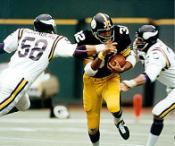 started
the hour's journey northward
started
the hour's journey northward 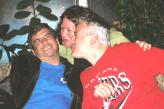 the
to family reunion with my sister Jois, a ride made longer by Thanksgiving
traffic and near sleet. As we
were leaving the parking
lot, heading toward the automated pay booth, a white van in front of us took
considerable time deciding which lane would be fastest, apparently desperate
to save 15 seconds. Then, like Franco
Harris finding a hole, he lurched four car lengths ahead to a pay station
with only one car ahead of him. My
brother, no dummy, followed. But
Franco, quite surprisingly, could not seem to get into the end zone.
After a few minutes of considering what had gone wrong in the "red
zone", I finally got out of the car to see if I could help punch it in.
In response to my offering him my services, Franco said in a Baltimore
accent so thick that I could see crab cakes between his teeth, "Hang in
there, Big Guy." Patiently
watching as
the
to family reunion with my sister Jois, a ride made longer by Thanksgiving
traffic and near sleet. As we
were leaving the parking
lot, heading toward the automated pay booth, a white van in front of us took
considerable time deciding which lane would be fastest, apparently desperate
to save 15 seconds. Then, like Franco
Harris finding a hole, he lurched four car lengths ahead to a pay station
with only one car ahead of him. My
brother, no dummy, followed. But
Franco, quite surprisingly, could not seem to get into the end zone.
After a few minutes of considering what had gone wrong in the "red
zone", I finally got out of the car to see if I could help punch it in.
In response to my offering him my services, Franco said in a Baltimore
accent so thick that I could see crab cakes between his teeth, "Hang in
there, Big Guy." Patiently
watching as he scurried
around trying to find his dropped change, I offered again, to which Franco
replied, "It'll just be one more second, Big Guy."
And true to his word, a moment later Franco burst through, spiking a
crab cake on his way to I-95. My
sleepy wife noted that, had this been in Israel, every horn in the nation from
every car that had ever busied an Israeli street would have been honking for
the entire five-minute interlude. It
seemed that Sara was already enjoying her little vacation.
Three hours later, the day before Thanksgiving, we arrived at Jeb's
house in the Baltimore suburbs, ready for a rest.
he scurried
around trying to find his dropped change, I offered again, to which Franco
replied, "It'll just be one more second, Big Guy."
And true to his word, a moment later Franco burst through, spiking a
crab cake on his way to I-95. My
sleepy wife noted that, had this been in Israel, every horn in the nation from
every car that had ever busied an Israeli street would have been honking for
the entire five-minute interlude. It
seemed that Sara was already enjoying her little vacation.
Three hours later, the day before Thanksgiving, we arrived at Jeb's
house in the Baltimore suburbs, ready for a rest.
Thanksgiving
was a superb family reunion, with not only Jeb's family and my sister Jois and
her family from Portland (as

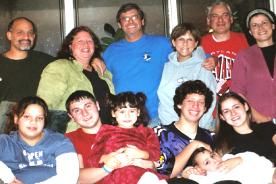 noted
by Yehuda), but with also my dear Auntie Helen from Seattle and her daughter
Karen's family from Bethesda. This
also served as the official Brownstein Children's Eighth Annual Reunion.
noted
by Yehuda), but with also my dear Auntie Helen from Seattle and her daughter
Karen's family from Bethesda. This
also served as the official Brownstein Children's Eighth Annual Reunion.
The
next night, Shabbat, was somewhat more subdued, with only 15 people, 30 short
of the day before. We gathered
'round the beautiful Shabbat table that Jeb's wife Cherie had set.
My brother Jeb -- the eldest of our generation including all of our
first cousins – was to make Kiddush
for the family. Jeb took our
great-great-grandfather Mesher's Kiddush cup, which had been handed down to
Jeb through four generations, from eldest to eldest, and handed it to me, the
youngest. Thinking that he was
asking me, ostensibly the most religiously
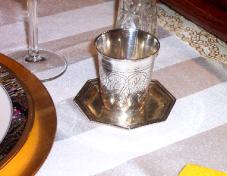 observant
member of our family, to make Kiddush for the family, I declined, cognizant
that, among other things, any level of religious observance or Zionism that
might be noticeable in me is a direct result of my brother's influence. In
short, this was his cup and his Kiddush to make.
observant
member of our family, to make Kiddush for the family, I declined, cognizant
that, among other things, any level of religious observance or Zionism that
might be noticeable in me is a direct result of my brother's influence. In
short, this was his cup and his Kiddush to make.
If
I was ill-suited to make Kiddush for the family, I was a thousand times less
equipped to deal with my brother's actual goal: to bequeath the cup, the
greatest of Brownstein-Slifman-Mesher heirlooms… to me and my family.
I was dumbstruck, as were the rest of those present.
My brother, who is keenly aware of my reverence for our family
traditions, was not surprised by my shock, especially without the slightest
explanation from him as to why he would ignore the explicit instructions of
four generations. Jeb, my Zionist
mentor, made it clear that in his opinion the cup belonged in Jerusalem with
me. After a few minutes of
fussing, I reluctantly accepted his offer, with the proviso that I would only
keep the cup for safekeeping until Jeb and Cherie occupy the Jerusalem
apartment that they bought a year ago -- hopefully upon retirement, and soon.
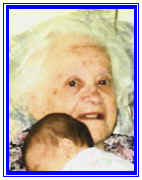 We
spent the lion's share of our Shabbat dinner reminiscing about our fraternal
grandmother, our matriarch, Vera Brownstein, or "Dobbie" as we fondly
called her, who died in her 90s, two weeks after my son, Yehuda, was born.
The tone for a reminiscence was set not only by Jeb's gesture, but also
by the chicken and garlicky eggplant spread that he had prepared Dobbie-style,
as she used to produce it every Shabbat before we all settled into a serious
game of Scrabble. Many of us spoke
of our favorite recollections of Dobbie. Jeb's
daughter, Elana, surprised us by announcing that she had kept all of the
eulogies from Dobbie's funeral six years earlier. I encouraged Elana to fetch them, and she read them aloud.
Dobbie would have loved nearly everything about the evening.
We
spent the lion's share of our Shabbat dinner reminiscing about our fraternal
grandmother, our matriarch, Vera Brownstein, or "Dobbie" as we fondly
called her, who died in her 90s, two weeks after my son, Yehuda, was born.
The tone for a reminiscence was set not only by Jeb's gesture, but also
by the chicken and garlicky eggplant spread that he had prepared Dobbie-style,
as she used to produce it every Shabbat before we all settled into a serious
game of Scrabble. Many of us spoke
of our favorite recollections of Dobbie. Jeb's
daughter, Elana, surprised us by announcing that she had kept all of the
eulogies from Dobbie's funeral six years earlier. I encouraged Elana to fetch them, and she read them aloud.
Dobbie would have loved nearly everything about the evening.
A
few days later, I went down to Washington to visit with one new friend and one
old friend.
Growing
up in Portland, we were friendly with the family of Harold & Jackie Pollin.
Harold owned the Portland Airport Sheraton and, when I needed a job out
of college, I put my shiny new Reed College liberal
 arts
B.A. to use as a bartender at "Harold's", the Sheraton lounge.
This was one of many times my path crossed the Pollins'.
Always we were aware that Harold's older brother, Abe
Pollin, was (as the kids say today) the bomb, owning such jewels as the
Washington Wizards (then Baltimore Bullets) for over 40 years, the Washington
Capitals, and the MCI Center. Abe
is now at least in his 80s and has recently become one of my heroes, not because
of his NBA ownership or wealth, but because of his incredible generosity and
support for Israel, which I discovered from reading an interview
of him that my company transcribed for Aish HaTorah.
So I wrote him and asked if I could meet with him, just to say hello, and
he graciously devoted a half hour to me in his conference room.
He was charming, frank, and warm.
arts
B.A. to use as a bartender at "Harold's", the Sheraton lounge.
This was one of many times my path crossed the Pollins'.
Always we were aware that Harold's older brother, Abe
Pollin, was (as the kids say today) the bomb, owning such jewels as the
Washington Wizards (then Baltimore Bullets) for over 40 years, the Washington
Capitals, and the MCI Center. Abe
is now at least in his 80s and has recently become one of my heroes, not because
of his NBA ownership or wealth, but because of his incredible generosity and
support for Israel, which I discovered from reading an interview
of him that my company transcribed for Aish HaTorah.
So I wrote him and asked if I could meet with him, just to say hello, and
he graciously devoted a half hour to me in his conference room.
He was charming, frank, and warm.
 Next
stop in Washington was a visit with Henry
Waxman, the most senior Jewish member of the House of
Next
stop in Washington was a visit with Henry
Waxman, the most senior Jewish member of the House of
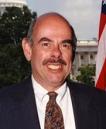 Representatives
and, more importantly, my good friend from the Old Country: Pico-Robertson. Henry and his wife Janet had become friendly with my family
over the past several years through their son Michael, and we had spent many a
Shabbat together during their frequent trips to "the district" (Los
Angeles).
Representatives
and, more importantly, my good friend from the Old Country: Pico-Robertson. Henry and his wife Janet had become friendly with my family
over the past several years through their son Michael, and we had spent many a
Shabbat together during their frequent trips to "the district" (Los
Angeles).
Although
I had let the Waxmen know we were going to be in Baltimore, when plans
for my immediate family to visit D.C. didn't materialize, I sort of let the
whole D.C. thing slip, not wanting to bug Henry. But Henry would have none of that, insisting that I come by
his office for lunch.
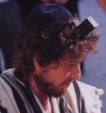 It
was positively surreal watching, at the entrance of the Sam Rayburn Congressional
Office Building,
the security
It
was positively surreal watching, at the entrance of the Sam Rayburn Congressional
Office Building,
the security officer tunnel down into my laptop bag, into my tallit
bag, and then into my tefillin
bag, gawking at the bizarre boxes
with straps. Few times in my life
have I been at a loss for words; this was one of them.
I just let her poke for a bit and try to decipher what she surely thought
was either Arabic or hieroglyphics, until she
was relatively certain that, whatever I had, it was inert and that I was
relatively unsubversive.
officer tunnel down into my laptop bag, into my tallit
bag, and then into my tefillin
bag, gawking at the bizarre boxes
with straps. Few times in my life
have I been at a loss for words; this was one of them.
I just let her poke for a bit and try to decipher what she surely thought
was either Arabic or hieroglyphics, until she
was relatively certain that, whatever I had, it was inert and that I was
relatively unsubversive.
Winding
around the walls of Congress on my way to Henry's office, I finally arrived in a
lobby replete with
 marvelous
photos of Henry shaking hands with my childhood heroes, including Vice President
Hubert
H. Humphrey and Senator Henry
"Scoop" Jackson. I
remembered attending a rally for HHH at the Portland
marvelous
photos of Henry shaking hands with my childhood heroes, including Vice President
Hubert
H. Humphrey and Senator Henry
"Scoop" Jackson. I
remembered attending a rally for HHH at the Portland
 Civic
Auditorium when he was running against Nixon in '68.
I remembered making signs containing the triple-"H", and still
have a campaign button. I was six.
And anyone who knows anything about Soviet Jewish history knows that
Washington State Senator Scoop Jackson was more responsible for liberating
Soviet Jews than any other American, through his Jackson-Vanik
Amendment, which limited US-Soviet trade because of their anti-Semitic
emigration policy. Further, given
the precipitous decline in the number of socially conscious politicians like
Humphrey, Jackson, and Waxman, this wall of photos seemed to be a blast from the
never-to-be-reclaimed past, like hanging out with Jerry
or Jimi.
Civic
Auditorium when he was running against Nixon in '68.
I remembered making signs containing the triple-"H", and still
have a campaign button. I was six.
And anyone who knows anything about Soviet Jewish history knows that
Washington State Senator Scoop Jackson was more responsible for liberating
Soviet Jews than any other American, through his Jackson-Vanik
Amendment, which limited US-Soviet trade because of their anti-Semitic
emigration policy. Further, given
the precipitous decline in the number of socially conscious politicians like
Humphrey, Jackson, and Waxman, this wall of photos seemed to be a blast from the
never-to-be-reclaimed past, like hanging out with Jerry
or Jimi.
The
most prominent wall in Henry's private office featured a matrix of photos of him
shaking hands with the most famous Israel-related leaders over the last 30
years, including many of our prime ministers.
I saw Moshe Dyan
and Yitzhak
Rabin and this king and that, a pantheon of greatness, mixed with missed
opportunities. One picture that
caught my eye was taken during the Oslo
signing celebrations at the White House and, regrettably, was of Henry
 with
Yasser Arafat. Knowing Henry as
well as I do, I understood that the photo was as much a legacy of Henry's innate
well of optimism as it was symbolic of a tragic mistake that ambushed the vast
majority of us. Having
grandchildren who are sabras,
having defended Israeli interests for 30 years on the floor of the House, behind
closed committee doors, and in town meetings, Henry has pro-Israel credentials
that are hard to exceed. The only
blemish on his record, it seemed to me, was his failure to throw that photo into
the Potomac.
with
Yasser Arafat. Knowing Henry as
well as I do, I understood that the photo was as much a legacy of Henry's innate
well of optimism as it was symbolic of a tragic mistake that ambushed the vast
majority of us. Having
grandchildren who are sabras,
having defended Israeli interests for 30 years on the floor of the House, behind
closed committee doors, and in town meetings, Henry has pro-Israel credentials
that are hard to exceed. The only
blemish on his record, it seemed to me, was his failure to throw that photo into
the Potomac.
Making
a mental note not to be the first one to cast stones, I accompanied Henry to the
congressional cafeteria,
 where
I hungrily searched for Danon yogurt and bags of chips, basically looking for
anything that was certified as kosher, of which there wasn't much.
During my live-culture/high-fat munch, people come over to pay their
respects to Henry, not thinking too much of interrupting our meal.
where
I hungrily searched for Danon yogurt and bags of chips, basically looking for
anything that was certified as kosher, of which there wasn't much.
During my live-culture/high-fat munch, people come over to pay their
respects to Henry, not thinking too much of interrupting our meal.
 After
lunch, upon returning to his office and catching up on the families and Beltway
business, I replayed my mental note and proceeded to lay it on the line with
Henry. I told him, "I can't leave this office, DC, or America, for that
matter, until Arafat's stench has been removed from your wall."
Henry readily agreed, allowing me to take down the piece of dreck,
and promising not to put it back up. He said he would substitute a photo of him
with our current prime minister.
After
lunch, upon returning to his office and catching up on the families and Beltway
business, I replayed my mental note and proceeded to lay it on the line with
Henry. I told him, "I can't leave this office, DC, or America, for that
matter, until Arafat's stench has been removed from your wall."
Henry readily agreed, allowing me to take down the piece of dreck,
and promising not to put it back up. He said he would substitute a photo of him
with our current prime minister.
Upon
my return to Israel I asked Henry if he minded my detailing this incident in my
Chronicles, noting the significance of an Israeli immigrant removing the picture
of a mass murderer from the wall of a United States congressman.
His gracious answer was, in part, "Feel free to report to the world
that you helped me see that Arafat did not rate a photo on my wall.
It did not hang there as a sign of respect.
You convinced me that a more respectful use of the photo was not to
display it at all. History will show that Arafat, rather than his photo,
deserved to be hung, for the enormous human misery he brought to the Jewish and
Palestinian people." Thanks,
Henry.


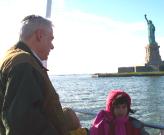


 That
was it for Washington.
Next, my family took a train up to New
York.
After a brief whirl
around Manhattan, a fabulous dinner with a bunch of old friends, and priceless
hospitality at the home of Miriam
and Avi
Lazar, we were off to LA. (Avi says
he prints out my chronicles for his family only if his name is mentioned, so
hello to all the Lazars.)
That
was it for Washington.
Next, my family took a train up to New
York.
After a brief whirl
around Manhattan, a fabulous dinner with a bunch of old friends, and priceless
hospitality at the home of Miriam
and Avi
Lazar, we were off to LA. (Avi says
he prints out my chronicles for his family only if his name is mentioned, so
hello to all the Lazars.)
In
Los Angeles we dined and visited with as many friends as time allowed.
Several people voiced displeasure about my chronicle that suggested
starkly that all religious Jews should make aliyah.
A few asked why, if I had felt so strongly about it, hadn't I come in my
20s or 30s? Others told me I had disregarded those who wish to make
aliyah but had been advised against it by their rabbi for various reasons.
Considering how inflammatory that chronicle had been, I was pleased by the
reception we received -- although 95% of the goodwill directed at our family may
actually have been because of my wife and kids!
The
top priority for my children, after visiting their old school and friends, was
Disneyland. Still a few weeks
before  Christmas,
the wife and I were reticent to plunge into what we thought might be Magic
Christmas Kingdom. However, nothing we ever imagined could approach the
Christmas madness that we found at that world-famous theme park.
Christmas,
the wife and I were reticent to plunge into what we thought might be Magic
Christmas Kingdom. However, nothing we ever imagined could approach the
Christmas madness that we found at that world-famous theme park.
We
had been working with our children to have them overcome baseless fears and to
grasp the developmental difference between pretend and reality.
(After paying entrance fees of $50 per adult and $40 per child, I had my
own fears to overcome.) We wanted the children to understand that there is
nothing to be scared of on the rides and to simply enjoy them.
(We forgot to tell them that only a few people per year are killed at
Disneyland.)
The
first ride was Pirates of the Caribbean. The
kids did great and the ride was exactly as I remembered it. Next came  the
the
 Haunted
House. Everything that could be Christmasized had been
Christmasized, from the elevator to the dining room to the ghosts. That all this pandering was done by Michael Eisner and the
rest of the "new" management was never far from the back of my mind.
As the day wore on, it became
clear that Pirates of the Caribbean was just about the only ride in the park
that had not been altered. Even the
Mad Tea Party teacup ride had been transformed into Santa's Little Goblet of
Eggnog.
Haunted
House. Everything that could be Christmasized had been
Christmasized, from the elevator to the dining room to the ghosts. That all this pandering was done by Michael Eisner and the
rest of the "new" management was never far from the back of my mind.
As the day wore on, it became
clear that Pirates of the Caribbean was just about the only ride in the park
that had not been altered. Even the
Mad Tea Party teacup ride had been transformed into Santa's Little Goblet of
Eggnog.
The
day was capped off by Disney's typically spectacular fireworks show, which
featured 10 minutes of orchestrated, synchronized Christmas music with 10
seconds of "Dreidel,
 Dreidel,
Dreidel". Ping-ponging
between my ears was the question whether I would have been more uncomfortable
had they not thrown this tiny bone to "our Jewish friends", or if,
without the infinitesimal Hanukkah interlude, we would have walked away from the
theme park complaining that there was not a shred of recognition that some
non-Christians inhabit the planet, particularly in Southern California, except
as caricatures in It's a Small World and the Jungle Cruise.
Dreidel,
Dreidel". Ping-ponging
between my ears was the question whether I would have been more uncomfortable
had they not thrown this tiny bone to "our Jewish friends", or if,
without the infinitesimal Hanukkah interlude, we would have walked away from the
theme park complaining that there was not a shred of recognition that some
non-Christians inhabit the planet, particularly in Southern California, except
as caricatures in It's a Small World and the Jungle Cruise.
I
made plans a few days later to have drinks at a sports bar with several of my
long-term employees. The evening went along fairly well.
On a big-screen TV I was able to watch my beloved, mediocre Portland
Trailblazers beat Seattle on a last-second three-point shot.
This was the first NBA basketball of any kind that I had seen since
moving to Israel.
During
the evening I mentioned to these dear, old friends -- many of whom I had
employed for the majority of their adult lives and feel very paternal towards
and who know me as well as anyone does, aside from Sara -- that I flew from
Israel on Lufthansa. The irony of
Rich Brownstein patronizing a German airline is as conspicuous as my yarmulke to
anybody who has spent any appreciable time with me.
So, imagine my surprise when a couple of my friends asked why Lufthansa
was so strange for me. Caught
completely off guard, I answered, "Because everything about Germany makes
me uncomfortable". Seizing the
moment, like starved inmates finally getting a chance to dig into a big steak,
they said almost in unison, "But my parents are German and I have German
cousins and it's not fair to group a nationality together because of something
that happened generations ago and..."
Utterly blindsided, I tried to explain, as just one example, that hearing
German for hours at a time is grating to me, like hearing a million babies wail.
During
that difficult conversation my mind wandered to some classmates in my Jerusalem
ulpan: two young Christian, German women. Having
had practically the same conversation with them before leaving, it would be
quite an understatement to say that they fully and instantaneously recognized my
discomfort concerning flying on their national airline.
There is not even the slightest question in their minds, as Christian
Germans living in Israel, that many Jews rightfully harbor inexhaustible
animosity towards Germany. It is,
as they have told me, part of the reason they came to Israel, generations
removed from the Holocaust: to try, in their modest ways, to atone for the
attempted genocide of their collective grandfathers.
Back
in the sports bar, even more than the day at Disneyland, my friends' anger
toward my core angst was another sure sign that home was 10 time zones to the
east.
I
ended the conversation with a fleeting attempt to fully explain my feelings.
Ultimately they agreed that, had my parents or grandparents died in the
Holocaust, I would then be "entitled" to my aversion to all things
German. But I failed to make the
two key points to my American friends that would have made them understand,
points that my German classmates internalized long ago: it is simply a
historical fluke that my family emigrated from the killing grounds before the
war and, although I did not have immediate relatives who were slaughtered by the
Germans, those who were killed were every bit my collective grandparents.
The Blazers won; I lost.
The
morning of our return flights from America started at 4 a.m.
We arrived at Dulles that evening only to learn that the plane to
Frankfurt that would connect to Tel Aviv had been delayed by four hours because
of an in-flight heart attack. The
Lufthansa terminal attendant said there was nothing to do but hope to make our
connection -- which was scheduled to take off 30 minutes before our delayed
flight was rescheduled to land. I
suggested that perhaps we should seek an alternative like, for instance, her
supervisor. Greta, the super, was standing nearby, dealing with another
Israeli who was similarly unimpressed with the ridiculous alternative presented.
Greta, the super, showed why she is super, not only by giving us $40 worth of
food vouchers for our four-hour wait, but, much more importantly, rebooking our
return from Frankfurt to Tel
 Aviv
on a flight leaving two hours after our arrival, on El Al.
You have no idea how ecstatic my wife was when I returned with the news
-- let alone the vouchers!
Aviv
on a flight leaving two hours after our arrival, on El Al.
You have no idea how ecstatic my wife was when I returned with the news
-- let alone the vouchers!
Smug
in the notion that Greta, the super, had thoroughly taking care of us, when we
finally arrived in Frankfurt I told my family to relax while the other
passengers rushed off to figure out their connections.
This belief that Greta had worked everything out for us turned out to be
one of my poorer assumptions: emerging (from the stinky Airbus), I grasped that
Greta's work had not, in fact, been so super after all and that, although we had
an El Al reservation, we had no ticket and had to figure out which of the
extraordinary (German) lines to wade through in order to get ticketed.
An hour and a half later, the kids' patience having run out, I emerged
with the full package -- having been assured several times that our luggage
would be on the El Al flight.
We
then started the long walk to the El Al gate.
German security checked everyone. Although
they did not feel the need to root about in my wife's hair again, my kids were
frisked and wanded. We eventually
got to yet another security point, at the end of our ropes, fearing we might not
have enough time to make the flight. The
bald dude who was set to check us there was by far the most intimidating dude I
had seen on this trip. Yet, just as
I was about to explain to him that we had been meticulously inspected, my wife
and I looked up with wonder and enormous relief when Big Bald Dude spoke to his
lapel -- in Hebrew. We were finally
on our way home, even if still in Frankfurt.
After chatting up Big Bald Dude with our not-ready-for-primetime ulpan
Hebrew, smiling ear to ear, we were waived down to the real El Al security
terminal. A few minutes later,
having answered the requisite questions and proving that we were in fact
Israelis, we were told to board.
On
a whim, I asked about our luggage. After
having deciphered that if I had not personally cleared my luggage in that
terminal, it was not on the flight, I told the family to board, and I went to
the adjacent luggage screening area. In
substandard Hebrew I asked, handing them my Israeli identity card, if they knew
about my luggage. They told me to
wait a few minutes, then lugged out our seven
 enormous
bags, sending each one through a machine and then having me open several for
inspection. My wife loves to put
little locks on the bags to prevent pilfering, so I was asked for the
combinations. I said to Moshe, the
head bag guy, "Isn't everybody's combination 613?"
enormous
bags, sending each one through a machine and then having me open several for
inspection. My wife loves to put
little locks on the bags to prevent pilfering, so I was asked for the
combinations. I said to Moshe, the
head bag guy, "Isn't everybody's combination 613?"
In
no time I was boarding the plane and was greeted by Moshe Two, who certainly
knew where all the Uzis are hidden and could use them at the drop of a stir
stick. For no particular reason, on
my way through the tunnel to Moshe Two I had reminisced about my earliest
arrivals in Israel when we would be treated, at the moment of landing, with the
spirited Zionist song "Heveinu Shalom
Aleichem". This practice
had
 been
discontinued many years ago, like those goofy oversized, orange-picking kibbutz
hats that tourists used to wear in Israel.
For several years I have longed to hear the song at touchdown. So I joked
with Moshe Two that they should play the song, suspecting that all of the tapes
probably rested in a landfill outside of Tel Aviv.
been
discontinued many years ago, like those goofy oversized, orange-picking kibbutz
hats that tourists used to wear in Israel.
For several years I have longed to hear the song at touchdown. So I joked
with Moshe Two that they should play the song, suspecting that all of the tapes
probably rested in a landfill outside of Tel Aviv.
The
El Al flight home was pleasant and restful, even though it was not on a jumbo
jet and my fellow countrymen incessantly requested everything from blankets to
better headphones to better seats. As
we approached Israel's coast, I pointed out to Yehuda and Batya the lights of
Tel Aviv. We had an extraordinarily
smooth landing courtesy of, doubtless, an ex-IAF fighter pilot. Then, wonder of
wonders, as the reverse engine whine died down, we heard the strains of
"Heveinu Shalom Aleichem". Sara
and I could barely contain ourselves. While disembarking, I asked Moshe Two if he had played it
just for me. The ex-commando simply
flashed one of those cute Israeli smiles that I adore, letting me know we were
home at last.
 The
next day Sara and I went to the post office.
She had been nudging me to get a phone card for Batya so Batya could call
from school if she felt the need. I told Rachel, one of my favorite clerks, that
we wanted a phone card. Rachel
declared, "You'll take the 180 shekel card because..." Sara whispered
to me the rest of the sentence that was implicit in Rachel's decision for us,
"because it is the best value." Although
I was not sure that I wanted the best value or, more to the point, that I wanted
to be told what I would take, I sheepishly accepted the card. As I searched my billfold for the sheks, Sara mentioned to
Rachel that the card was for our eight-year-old daughter. Without even looking up, Rachel said, "For an
eight-year-old you will take the 20 shekel card.
She'll lose it soon enough." Home
at last.
The
next day Sara and I went to the post office.
She had been nudging me to get a phone card for Batya so Batya could call
from school if she felt the need. I told Rachel, one of my favorite clerks, that
we wanted a phone card. Rachel
declared, "You'll take the 180 shekel card because..." Sara whispered
to me the rest of the sentence that was implicit in Rachel's decision for us,
"because it is the best value." Although
I was not sure that I wanted the best value or, more to the point, that I wanted
to be told what I would take, I sheepishly accepted the card. As I searched my billfold for the sheks, Sara mentioned to
Rachel that the card was for our eight-year-old daughter. Without even looking up, Rachel said, "For an
eight-year-old you will take the 20 shekel card.
She'll lose it soon enough." Home
at last.
Later
that day, as I drove home from the store with a load of groceries, having
already endured Irving Berlin's "White Christmas" and then being
serenaded by the Mormon Tabernacle Choir's thrilling rendition of Jingle Bells,
I felt that everything was wrong. It
was impossible to accept that this much of the American culture that I had fled
was so seamlessly
 invading
my beloved Israel. I half expected
to find at Mini Israel -- the
amusement park between Jerusalem and Tel Aviv that is a model of Israel's
highlights -- a temporary manger. Yet,
without knowing how, I was dead sure that I was going to exonerate the situation
-- somehow. Then, looking down at
the radio, I realized that the randomly chosen station was 96.3 -- Radio Jordan.
I pushed one of the presets, and my ears filled with Shalom
Hanoch. My journey back home
was complete.
invading
my beloved Israel. I half expected
to find at Mini Israel -- the
amusement park between Jerusalem and Tel Aviv that is a model of Israel's
highlights -- a temporary manger. Yet,
without knowing how, I was dead sure that I was going to exonerate the situation
-- somehow. Then, looking down at
the radio, I realized that the randomly chosen station was 96.3 -- Radio Jordan.
I pushed one of the presets, and my ears filled with Shalom
Hanoch. My journey back home
was complete.
Anyway,
thanks for reading between the lines this far.
I
appreciate and look forward to your comments and greetings.
As
you know, we are in the middle of a membership drive, so please get me the
e-mail addresses of people whom you want to add.
(Let them know ahead of time, so I don't get in trouble with the spam
police).
Please
stay tuned for Chapter 22: “The Dentist.”
All
the best,
Rich
Brownstein
PO
Box 8130
91081
Jerusalem
ISRAEL
Phone:
(310) 597-4230 (Free From America)
Phone:
011-972-2-6733-491
CURRENT
DISTRIBUTION: 550 worldwide
NOTE:
No
barf bags were harmed in this story.
All
characters and events are purely fictional.
If
you want to add someone to this list, or remove yourself, just e-mail rich@brownsteins.net
and let him know. He's cool about
it. Honest.
I know him.
Please
freely distribute to those with too much time on their hands.
NEXT
CHRONICLE
 blamed
Israel for the tsunami in southeast Asia, preached the
blamed
Israel for the tsunami in southeast Asia, preached the
 destruction
of Israel and the U.S..."; "could
have been the result of joint American, Israeli and Indian underwater weapons
testing, an Egyptian weekly and other Arab media charged."; and
"In
media commentaries and sermons, the tsunami is being blamed on the region’s
favorite villains, starting with Israel and the United States, and on the sin
of the nations ravaged by the disaster."
Keeping in mind that the tsunami-causing earthquake measured 9+ on the
Richter scale, at least 5000 times more powerful than the $40 billion
Northridge Earthquake, I think you can see that we are, indeed, a very
powerful little nation.
destruction
of Israel and the U.S..."; "could
have been the result of joint American, Israeli and Indian underwater weapons
testing, an Egyptian weekly and other Arab media charged."; and
"In
media commentaries and sermons, the tsunami is being blamed on the region’s
favorite villains, starting with Israel and the United States, and on the sin
of the nations ravaged by the disaster."
Keeping in mind that the tsunami-causing earthquake measured 9+ on the
Richter scale, at least 5000 times more powerful than the $40 billion
Northridge Earthquake, I think you can see that we are, indeed, a very
powerful little nation. Israel,
indeed the world, whose word I trust implicitly, it is Natan
Sharansky. On January 6,
2005, three days before the election, Sharansky set the record straight
concerning the difference between this election -- a one-party, Soviet style
international show -- and free elections: "That
monitors will probably declare these elections free of fraud should also not
earn them a democratic imprimatur. Soviet elections were also free of fraud.
There was simply only one party on the ballot."
And then, confirming fraud, a week after the election came the report
that 46 of the top Palestinian election officials resigned because, "…pressures
and threats lessened the degree of the integrity of the election…",
as reported by Al-Jazeera. Leave
it to our Palestinian friends to recognize and speak out against oppression
and injustice after having participated in it.
Of course, the cherry on the top of this creamy cupcake are the words
of the antithesis of Natan Sharansky, former President pro-Arab
Jimmy Carter, a man who never saw an enemy
Israel,
indeed the world, whose word I trust implicitly, it is Natan
Sharansky. On January 6,
2005, three days before the election, Sharansky set the record straight
concerning the difference between this election -- a one-party, Soviet style
international show -- and free elections: "That
monitors will probably declare these elections free of fraud should also not
earn them a democratic imprimatur. Soviet elections were also free of fraud.
There was simply only one party on the ballot."
And then, confirming fraud, a week after the election came the report
that 46 of the top Palestinian election officials resigned because, "…pressures
and threats lessened the degree of the integrity of the election…",
as reported by Al-Jazeera. Leave
it to our Palestinian friends to recognize and speak out against oppression
and injustice after having participated in it.
Of course, the cherry on the top of this creamy cupcake are the words
of the antithesis of Natan Sharansky, former President pro-Arab
Jimmy Carter, a man who never saw an enemy  of
Israel he didn't like or
of
Israel he didn't like or an Israeli Prime Minister
who hadn't offered
enough: "When
asked if he was pleased with the elections process so far, he answered with a
curt, "No." Carter spent the greater part of the morning trying to
negotiate with the Israelis to allow Palestinians to vote in East Jerusalem
even if their names were somehow not on the list."
Way to keep your eye on the ball!
an Israeli Prime Minister
who hadn't offered
enough: "When
asked if he was pleased with the elections process so far, he answered with a
curt, "No." Carter spent the greater part of the morning trying to
negotiate with the Israelis to allow Palestinians to vote in East Jerusalem
even if their names were somehow not on the list."
Way to keep your eye on the ball! Finally,
as if anyone should be surprised, within days of international pressure, with
massive numbers
Finally,
as if anyone should be surprised, within days of international pressure, with
massive numbers  of
Israeli tanks on the outskirts of Gaza poised to cleanse that cesspool of what
Mahmoud Abbas (a.k.a. Abu Mazen a.k.a. Arafat
II) referred to as "freedom
fighters" against the "Zionist enemy", Mahmoud seems to
have miraculously
shut down Palestinian artillery fire into Israeli civilian communities
with more ease than Betty Crocker
could whip up a cake. It makes one wonder who his predecessor really thought was being
fooled.
of
Israeli tanks on the outskirts of Gaza poised to cleanse that cesspool of what
Mahmoud Abbas (a.k.a. Abu Mazen a.k.a. Arafat
II) referred to as "freedom
fighters" against the "Zionist enemy", Mahmoud seems to
have miraculously
shut down Palestinian artillery fire into Israeli civilian communities
with more ease than Betty Crocker
could whip up a cake. It makes one wonder who his predecessor really thought was being
fooled. way home
with a load of groceries that pretty much fulfilled my wife's requests -- or
as well as this husband could. More
from habit than need, I turned on the radio.
I could not figure out
way home
with a load of groceries that pretty much fulfilled my wife's requests -- or
as well as this husband could. More
from habit than need, I turned on the radio.
I could not figure out
 off
the bat if it was Frank
or Bing, but it ended
up being Dean's
"White Christmas". I
was still so jet-lagged that I was slow to take offense, and at least it was written
by a Jew. But when that
winter blast ended soon enough, my discomfort lurched, like Hoffman on Olivier's dental chair,
when, as I drove down my Jerusalem street, the next song was "Jingle
Bells". With no readily
available,
convenient, xenophobic excuse,
I suddenly found myself having to contemplate how much of what we hoped we had
left behind in America was relentlessly creeping into Israeli culture, just as
good toilet
off
the bat if it was Frank
or Bing, but it ended
up being Dean's
"White Christmas". I
was still so jet-lagged that I was slow to take offense, and at least it was written
by a Jew. But when that
winter blast ended soon enough, my discomfort lurched, like Hoffman on Olivier's dental chair,
when, as I drove down my Jerusalem street, the next song was "Jingle
Bells". With no readily
available,
convenient, xenophobic excuse,
I suddenly found myself having to contemplate how much of what we hoped we had
left behind in America was relentlessly creeping into Israeli culture, just as
good toilet  paper
and Duncan Hines (parve)
cake mix had made their indelible marks.
But Christmas music in Jerusalem is a blazing red flag, a line in the
sand crossed, a heretofore sacrosanct mental security barrier that I thought
had been authorized by the UN
in 1947, intended to protect me from cultural terrorism.
I had absolutely no idea yet how this was going to end, but I was
certain of at least one thing: I had just experienced "a Chronicle
moment"…
paper
and Duncan Hines (parve)
cake mix had made their indelible marks.
But Christmas music in Jerusalem is a blazing red flag, a line in the
sand crossed, a heretofore sacrosanct mental security barrier that I thought
had been authorized by the UN
in 1947, intended to protect me from cultural terrorism.
I had absolutely no idea yet how this was going to end, but I was
certain of at least one thing: I had just experienced "a Chronicle
moment"… (not
much of a choice and no seats either) or their only other partner that flies
to Israel: Lufthansa, a.k.a. "Air Germany."
(not
much of a choice and no seats either) or their only other partner that flies
to Israel: Lufthansa, a.k.a. "Air Germany."  The
night of departure, we arrived at Israel's brand-new Terminal Three so early
that the security line had not even formed, not that there was anybody to
check us anyway. Eventually the
security shift started and we got in line with a lot of evangelicals and very
few Israelis. My son, Yehuda,
announced to everyone within earshot the entire itinerary of our trip.
"First we're going to Uncle Jeb.
He's in Baltimore. He's my
daddy's brother. Aunt Jois will
be there, too. She's my daddy's
sister. She lives in Portland,
but we're not going there. We're
going to see Bette and Noam and Ari and Elana, but we saw Elana a lot last
year because she lived in Jerusalem and we saw Bette and Noam in the summer
because Uncle Dudi is Israeli… Then we are going to New York. We're going to see Cousin Joy and the Statue of Liberty.
Then we're going to Los Angeles to see Disneyland.
I used to live in Los Angeles, but now I live in Jerusalem.
I am an Israeli…"
The
night of departure, we arrived at Israel's brand-new Terminal Three so early
that the security line had not even formed, not that there was anybody to
check us anyway. Eventually the
security shift started and we got in line with a lot of evangelicals and very
few Israelis. My son, Yehuda,
announced to everyone within earshot the entire itinerary of our trip.
"First we're going to Uncle Jeb.
He's in Baltimore. He's my
daddy's brother. Aunt Jois will
be there, too. She's my daddy's
sister. She lives in Portland,
but we're not going there. We're
going to see Bette and Noam and Ari and Elana, but we saw Elana a lot last
year because she lived in Jerusalem and we saw Bette and Noam in the summer
because Uncle Dudi is Israeli… Then we are going to New York. We're going to see Cousin Joy and the Statue of Liberty.
Then we're going to Los Angeles to see Disneyland.
I used to live in Los Angeles, but now I live in Jerusalem.
I am an Israeli…"
 Soon
enough we squeezed into our coach-class row, my wife all giddy about how
beautiful the Airbus
Soon
enough we squeezed into our coach-class row, my wife all giddy about how
beautiful the Airbus  A-330
was in comparison to the Boeing 777. I
think the thin air had
gotten to her because, honestly, it simply sounded like gibberish to me, like
insisting to me that Adidas
A-330
was in comparison to the Boeing 777. I
think the thin air had
gotten to her because, honestly, it simply sounded like gibberish to me, like
insisting to me that Adidas ![]() is
better than Nike. Nonetheless, if it
makes my Paris-born wife happy to believe that her heavily subsidized
Euro-trash-bus can hold a candle to the sleek jumbo jet made in my Pacific
Northwest, who am I to argue?
is
better than Nike. Nonetheless, if it
makes my Paris-born wife happy to believe that her heavily subsidized
Euro-trash-bus can hold a candle to the sleek jumbo jet made in my Pacific
Northwest, who am I to argue?


 Mealtime
came and, despite the thousands of calories we had already snacked on just for
the fun of traveling, we were looking forward to that special moment when a
Lufthansa flight attendant would announce, "Herr Brownstein: here is your
kosher meal (that you ordered three months ago and verified a month ago and
also four days ago)." It didn't happen. Of course, normally I
would have leapt, like Bob
Beamon, to the obvious conclusion that not having our kosher meals onboard
German Airlines is a cut and dried case of anti-Semitism. Call Marvin
Heir, right? No, not in this particular case. With the flight
originating from Tel Aviv, even Johnnie
Cochran would have had a hard time using the race card. On the other
hand, the Lufthansa attendants were extraordinarily gracious -- almost too
compassionate about the mishap. In fact, in contrast to every American
airline that has botched our meals, Lufthansa almost immediately took three
complete sets of kosher meals out of reserve practically without missing a
beat -- two of which we ate.
Mealtime
came and, despite the thousands of calories we had already snacked on just for
the fun of traveling, we were looking forward to that special moment when a
Lufthansa flight attendant would announce, "Herr Brownstein: here is your
kosher meal (that you ordered three months ago and verified a month ago and
also four days ago)." It didn't happen. Of course, normally I
would have leapt, like Bob
Beamon, to the obvious conclusion that not having our kosher meals onboard
German Airlines is a cut and dried case of anti-Semitism. Call Marvin
Heir, right? No, not in this particular case. With the flight
originating from Tel Aviv, even Johnnie
Cochran would have had a hard time using the race card. On the other
hand, the Lufthansa attendants were extraordinarily gracious -- almost too
compassionate about the mishap. In fact, in contrast to every American
airline that has botched our meals, Lufthansa almost immediately took three
complete sets of kosher meals out of reserve practically without missing a
beat -- two of which we ate.  We
landed in Frankfurt for the three-hour layover. Without exaggeration,
Frankfurt has the least comfortable airport I have ever been forced to hang
out in. Because we were early for
the connection, we were actually barred from going to the gate, a first for
me; the efficient German policy is to put 10,000 people in a duty-free area
fighting for one chair. It really sucked. When
our time finally came to go to the
We
landed in Frankfurt for the three-hour layover. Without exaggeration,
Frankfurt has the least comfortable airport I have ever been forced to hang
out in. Because we were early for
the connection, we were actually barred from going to the gate, a first for
me; the efficient German policy is to put 10,000 people in a duty-free area
fighting for one chair. It really sucked. When
our time finally came to go to the
 gate,
Sara and I purposely readied our Israeli passports to show German security.
Not to be outdone, because Sara does not bare her head in public, our
German friends hustled her off to a little booth where a woman removed Sara's
hat and ran her fingers through my wife's hair just to be sure she wasn't
stowing a bomb in there. Yehuda
and Batya were also frisked for the first times in their lives.
gate,
Sara and I purposely readied our Israeli passports to show German security.
Not to be outdone, because Sara does not bare her head in public, our
German friends hustled her off to a little booth where a woman removed Sara's
hat and ran her fingers through my wife's hair just to be sure she wasn't
stowing a bomb in there. Yehuda
and Batya were also frisked for the first times in their lives. German
counterpart, United had no record of the Brownsteins' request.
Nevertheless, United's representative said that he would make every
effort to accommodate us, but cautioned that Frankfurt is not Tel Aviv or New
York. Duh.
Two hours later, with a belly full of kosher food, giddy in my spacious
777 with 12 bad movies to ignore, I wondered which was the greater trick:
Lufthansa's having taken on a few extra kosher meals in Tel Aviv, or United's
scrounging eight kosher meals (dinner and breakfast) within an hour in
Germany.
German
counterpart, United had no record of the Brownsteins' request.
Nevertheless, United's representative said that he would make every
effort to accommodate us, but cautioned that Frankfurt is not Tel Aviv or New
York. Duh.
Two hours later, with a belly full of kosher food, giddy in my spacious
777 with 12 bad movies to ignore, I wondered which was the greater trick:
Lufthansa's having taken on a few extra kosher meals in Tel Aviv, or United's
scrounging eight kosher meals (dinner and breakfast) within an hour in
Germany. Volvo
and
Volvo
and  started
the hour's journey northward
started
the hour's journey northward the
to family reunion with my sister Jois, a ride made longer by Thanksgiving
traffic and near sleet. As we
were leaving the parking
lot, heading toward the automated pay booth, a white van in front of us took
considerable time deciding which lane would be fastest, apparently desperate
to save 15 seconds. Then, like Franco
Harris finding a hole, he lurched four car lengths ahead to a pay station
with only one car ahead of him. My
brother, no dummy, followed. But
Franco, quite surprisingly, could not seem to get into the end zone.
After a few minutes of considering what had gone wrong in the "red
zone", I finally got out of the car to see if I could help punch it in.
In response to my offering him my services, Franco said in a Baltimore
accent so thick that I could see crab cakes between his teeth, "Hang in
there, Big Guy." Patiently
watching as
 he scurried
around trying to find his dropped change, I offered again, to which Franco
replied, "It'll just be one more second, Big Guy."
And true to his word, a moment later Franco burst through, spiking a
crab cake on his way to I-95. My
sleepy wife noted that, had this been in Israel, every horn in the nation from
every car that had ever busied an Israeli street would have been honking for
the entire five-minute interlude. It
seemed that Sara was already enjoying her little vacation.
Three hours later, the day before Thanksgiving, we arrived at Jeb's
house in the Baltimore suburbs, ready for a rest.
he scurried
around trying to find his dropped change, I offered again, to which Franco
replied, "It'll just be one more second, Big Guy."
And true to his word, a moment later Franco burst through, spiking a
crab cake on his way to I-95. My
sleepy wife noted that, had this been in Israel, every horn in the nation from
every car that had ever busied an Israeli street would have been honking for
the entire five-minute interlude. It
seemed that Sara was already enjoying her little vacation.
Three hours later, the day before Thanksgiving, we arrived at Jeb's
house in the Baltimore suburbs, ready for a rest.
 noted
by Yehuda), but with also my dear Auntie Helen from Seattle and her daughter
Karen's family from Bethesda. This
also served as the official Brownstein Children's Eighth Annual Reunion.
noted
by Yehuda), but with also my dear Auntie Helen from Seattle and her daughter
Karen's family from Bethesda. This
also served as the official Brownstein Children's Eighth Annual Reunion.  observant
member of our family, to make Kiddush for the family, I declined, cognizant
that, among other things, any level of religious observance or Zionism that
might be noticeable in me is a direct result of my brother's influence. In
short, this was his cup and his Kiddush to make.
observant
member of our family, to make Kiddush for the family, I declined, cognizant
that, among other things, any level of religious observance or Zionism that
might be noticeable in me is a direct result of my brother's influence. In
short, this was his cup and his Kiddush to make. We
spent the lion's share of our Shabbat dinner reminiscing about our fraternal
grandmother, our matriarch, Vera Brownstein, or "Dobbie" as we fondly
called her, who died in her 90s, two weeks after my son, Yehuda, was born.
We
spent the lion's share of our Shabbat dinner reminiscing about our fraternal
grandmother, our matriarch, Vera Brownstein, or "Dobbie" as we fondly
called her, who died in her 90s, two weeks after my son, Yehuda, was born. arts
B.A. to use as a bartender at "Harold's", the Sheraton lounge.
arts
B.A. to use as a bartender at "Harold's", the Sheraton lounge. Representatives
and, more importantly, my good friend from the Old Country: Pico-Robertson.
Representatives
and, more importantly, my good friend from the Old Country: Pico-Robertson. It
was positively surreal watching, at the entrance of the Sam Rayburn Congressional
Office Building,
the security
It
was positively surreal watching, at the entrance of the Sam Rayburn Congressional
Office Building,
the security officer tunnel down into my laptop bag, into my
officer tunnel down into my laptop bag, into my  marvelous
photos of Henry shaking hands with my childhood heroes, including Vice President
marvelous
photos of Henry shaking hands with my childhood heroes, including Vice President
 Civic
Auditorium when he was running against Nixon in '68.
Civic
Auditorium when he was running against Nixon in '68. with
Yasser Arafat.
with
Yasser Arafat. After
lunch, upon returning to his office and catching up on the families and Beltway
business, I replayed my mental note and proceeded to lay it on the line with
Henry. I told him, "I can't leave this office, DC, or America, for that
matter, until Arafat's stench has been removed from your wall."
After
lunch, upon returning to his office and catching up on the families and Beltway
business, I replayed my mental note and proceeded to lay it on the line with
Henry. I told him, "I can't leave this office, DC, or America, for that
matter, until Arafat's stench has been removed from your wall."




 That
was it for Washington.
Next, my family took a train up to New
York.
That
was it for Washington.
Next, my family took a train up to New
York. Christmas,
the wife and I were reticent to plunge into what we thought might be Magic
Christmas Kingdom.
Christmas,
the wife and I were reticent to plunge into what we thought might be Magic
Christmas Kingdom. the
the
 Haunted
House.
Haunted
House.
 Aviv
on a flight leaving two hours after our arrival, on El Al.
Aviv
on a flight leaving two hours after our arrival, on El Al. The
next day Sara and I went to the post office.
The
next day Sara and I went to the post office. invading
my beloved Israel.
invading
my beloved Israel.